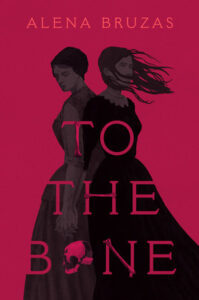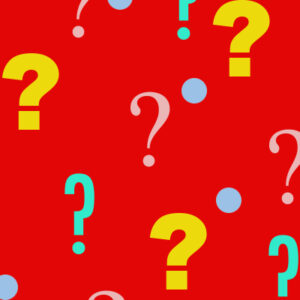What is literary horror and why do we have to make things complicated, you might ask. Complicated books for complicated folks, I say! It’s a scary book that also, in my opinion, has a philosophical bent, sometimes it’s about racism or misogyny or classism, or it might be a reflection of a time in the author’s life.
My new book To The Bone is literary horror that tells the true story of The Starving Time, when, in the winter of 1609-1610, an estimated 75% of the settlers starved at the Jamestown Colony and (gasp) there were instances of cannibalism; some survival, one murder most gruesome. It’s pretty horrifying stuff, all the more so because it really happened. But it’s also a story about oppressive power structures and domestic abuse. I felt compelled to tell the story of a woman who was murdered by her husband because I escaped my own abusive marriage only with the help of my family. What would it be like to be stuck in a tiny house and besieged in a fort, when the food was scarce and your husband looked at you with increasingly hungry eyes?
Literary horror scares us because it tells us something true about ourselves or the world we live in. But it also, for me at least, helps me process my trauma. In honor of spooky season here are some of my all-time favorites so we can all sob and be scared together.
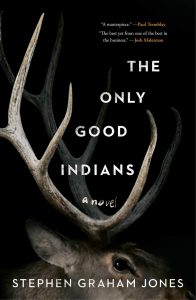
Stephen Graham Jones, The Only Good Indians
The Only Good Indians by Stephan Graham Jones deserves top billing on this list. As a reader it enthralled me. As a writer it gave me the kind of despair an artist feels when they behold a true master and know they will never measure up. Jones is well known enough that he needs no introduction, so let me just tell you why I love this book. First, the writing; so good, weird yet gorgeous, realistic but reflective and deep. The book follows four friends, men of the Blackfeet nation, who ten years prior killed an elk, unaware that it was pregnant. Lewis is my favorite narrator, although it switches point of view often and with intention. Lewis’s descent into madness is *chef’s kiss* as he is consumed by guilt and grief for the mother elk and her fetus, and is convinced a woman with the head of an elk is hunting him. The story grapples with what it is to be an indigenous person in America today, and the contradictions inherent to individual identity and tradition. Jones also gives space to the point of view of the elk woman who actually is hunting the four friends and manages, despite the violence and visceral anger of her perspective, to have me rooting for her until it comes to a showdown between the elk woman and Denorah, the teenage daughter of one of the four, and an exceptional final girl.
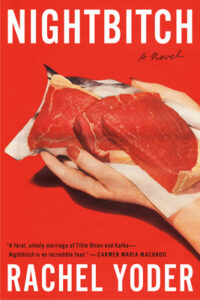
Rachel Yoder, Nightbitch
Nightbitch by Rachel Yoder is hilarious and weird and an excellent metaphor for the alienation of identity one feels as a new mother. The mother has no name (see: alienation) and the name Nightbitch emerges when she snaps at her husband because he’s being unhelpful-as-usual while she’s struggling to get her two-year-old to sleep. The husband travels frequently for work which hit me hard as a mother; those middle-of-the-nights when you’re up with a baby who never sleeps and you’re all alone, desperate, angry, feral. The mother finds herself slowly turning into a dog. Is it really happening or is she going crazy? Is being a mother a bit like getting cabin fever, only instead of murdering your family with an ax, you and your two year old play in the street in the dead of night, pretending to be wolves hunting rabbits? It’s only through her surrender to her monstrous feminine (who needs divine feminine?) that she feels at peace with motherhood.

Octavia Butler, Kindred
Kindred by Octavia Butler is a scifi-esque novel that is on this list because even though it isn’t exactly horror, the premise truly horrified me. It’s 1976 when Dana, a writer and a Black woman, finds herself transported back in time to the antebellum south. This happens again and again, every time her white slave-owning ancestor’s life is in danger. She is stuck in the past for longer and longer, and watches her ancestor grow from a small and innocent child to a man who enslaves other humans and rapes a free Black woman, who is also Dana’s ancestor. Butler said about the writing of Kindred that she “set out to make people feel history,” and it works. When Butler writes through the perspective of a Black woman with modern sensibilities who is stuck in the past, it creates a visceral and horrifying narrative of antebellum south that will give you nightmares.
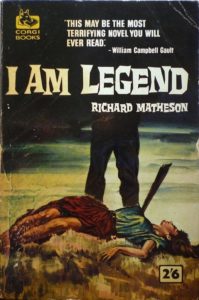
Richard Matheson, I Am Legend
I am Legend by Richard Matheson is ostensibly about vampires, but really it’s a grandfather to zombie horror and the last man on earth trope. Robert Neville is a scientist, alone and surrounded by the infected, vampire-like creatures which Neville hunts in the daytime, killing them in their beds and sometimes experimenting on them to “find a cure” or maybe just out of curiosity. Eventually he encounters a woman, Ruth, and (of course) they fall in love. But, alas, it turns out Ruth is a vampire and Neville is a bigot. The infected have formed a society and Neville, finally captured, is to be executed for his heinous crimes. As he faces the crowds, he reflects that he has become a legend, a horror story that the vampires will pass on to their children, like what vampires once were to humans. I love this book because it flips your expectation on its head, forcing you to consider what makes a monster, and if, under the right circumstances, you would be the horror story.

Stephen King, The Shining
The Shining by Stephen King seems like an obvious choice, maybe too obvious, but hear me out. As with the other options on this list, the reason to love this book is because it comes from a place of deep reflection by the author. Unlike the movie (which Stephan King famously dislikes) Jack Torrance is not always struggling to suppress his crazy, à la Jack Nicholson. He’s a recovered alcoholic who deeply loves his child and feels serious guilt for the abusiveness that came out during his worst drinking days. King wrote the book during his own struggles with alcohol abuse and weaves into it a thread of despair, detailing how much Torrance loves his son and how terrified he is of hurting him again. It truly is the supernatural elements of The Overlook Hotel that turns Torrance into a psycho who torments his family. It’s possible even in this day and age that you don’t know the story, so I won’t spoil the ending. But don’t just watch the movie, read the book for the painful and beautiful reflection on parenting and substance abuse that comes along with the terrifying ghosts.
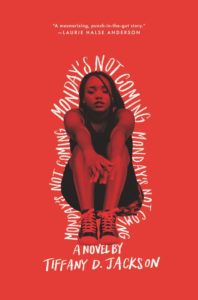
Tiffany D. Jackson, Monday’s Not Coming
Monday’s Not Coming by Tiffany D. Jackson is the only Young Adult novel that makes this list, and it’s a doozy. In the form of a psychological horror Jackson gives us Claudia, a Black teen girl living in Baltimore who loves to dance and is missing her best friend, Monday. When Monday’s disappearance becomes so prolonged that Claudia is concerned, nobody seems to care that she’s missing. The mystery of what happened to Monday and how Claudia processes it is fascinating but the real horror is how our institutions fail Black woman and girls, especially when they’re vulnerable.
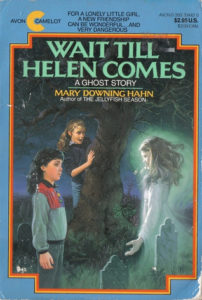
Mary Dowling Hahn, Wait Till Helen Comes
Wait Till Helen Comes by Mary Dowling Hahn terrified me as a kid. I vividly remember a solid six months in which my sister and me couldn’t go to the bathroom alone because we were so freaked out by this book. I read it again as an adult because of course I wanted to see if it was still terrifying and yes, dear reader, it held up. Helen is a ghost who seems like great fun when she befriends seven-year-old chaos monster Heather, but her older stepsister Molly knows better and ya know, shenanigans ensue. What stayed with me until adulthood was not just fear of death which seems pretty basic, but the fear of your own body. Molly reflects late in the story; “I ran out of the graveyard, anxious to get away from the bones buried under my feet, but knowing I couldn’t get away from the bones under my skin. No matter how fast I ran, they would always be there.” Oof, chilling.
***


